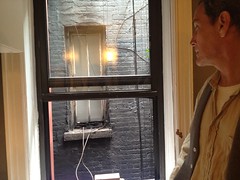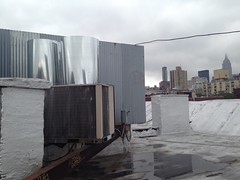This feud over an air conditioning unit certainly isn’t cooling off.
Employees of a Hamptons Market Place at 356 East 13th Street switched off power to their entire building this morning, leaving 16 apartments without electricity for about an hour. Outraged tenants said it’s only the latest disruption that has been inflicted on them by the deli, which installed an air conditioner and ventilator unit on the roof that has bothered them to no end.
The owner of the deli, who has grown weary of a year of noise complaints, is so fed up that today he raised the possibility of a harassment suit against the tenants.
“I can’t get a psychiatrist to come into their apartments but I wish I could,” the owner, Victor Nagi said, later adding, “The tenants are harassing me. They’re complaining every other day and getting me these fines.”
But before Mr. Nagi can pursue his own legal fight, he’ll have to deal with the fallout from his decision to cut off power to the rest of the five-story building at East 13th Street and First Avenue due to a ceiling leak in his deli. At around 9:30 a.m. Mr. Nagi said his employees had no choice but to cut the electricity because the leak had caused sparks to fly in his deli, raising fears of a fire.
He also admitted to having turned off the power on several previous occasions for the same reason.
The leak, he believed, came from the plumbing of the tenants above him, some of whom had complained about noise from the deli for months.
Two of the tenants who have spearheaded the fight against the Hamptons Market Place’s rooftop units, Tommy McKean and his neighbor Laura Dobbins, said there was no evidence that their apartments were the source of the problem.
“We can’t help but feel there’s an element of retaliation,” Ms. Dobbins, a 20-year resident of the building, said of the power outage.
The pair, along with another neighbor, Dirk Vandenberk, admitted yesterday that the noise had abated somewhat in the last two weeks thanks to modifications by the deli. When The Local dropped into Ms. Dobbins’ top-floor apartment yesterday for its own noise assessment, the rooftop unit seemed roughly equivalent to the hum of a window air conditioner.
But Mr. McKean is especially sensitive to the noise because he sleeps with his window open. “The point of how these apartments are laid out is to get ventilation through an air shaft. And if I do that, I can’t sleep at all,” he said. As far as he’s concerned, the improvements are insufficient. “It’s as if someone who owes you $1,000 has paid you back $30 and they say, ‘What’s the problem? We’ve been paying you back.'”
Mr. Nagi countered that there was little more he could do to alleviate the noise. “The tenants are crazy,” he said. “I’ve gone to a tremendous length and expense to resolve the problem.” He noted that he had twice moved the air conditioning unit on the roof, put a wall around part of it, added insulation, bought another unit for the interior of the deli so he wouldn’t have to switch the main one on at night, and hired a noise engineer.
A spokeswoman for the Department of Environmental Protection, which declared the ventilator unit over the legal noise limit last September, said the agency was still adjudicating noise violations tied to the equipment.
But that wasn’t enough for Mr. McKean. He said that unless he received notice of specific steps being taken by his landlord in the next week, he and a few of his neighbors plan to file a lawsuit in city housing court forcing the landlord to alleviate the noise.
Chris Verni, the building’s landlord, said that it was the city’s job to judge Mr. Nagi’s compliance. “We’ve owned the building for a long time, and we obviously want to work in a cooperative fashion with them,” he said.
With two of the disgruntled residents living in rent-stabilized apartments and Mr. Nagi only two years into his ten-year lease, it may be a tense environment well into the future.
“Our first priority is just to have livable apartments again,” Mr. McKean said.






